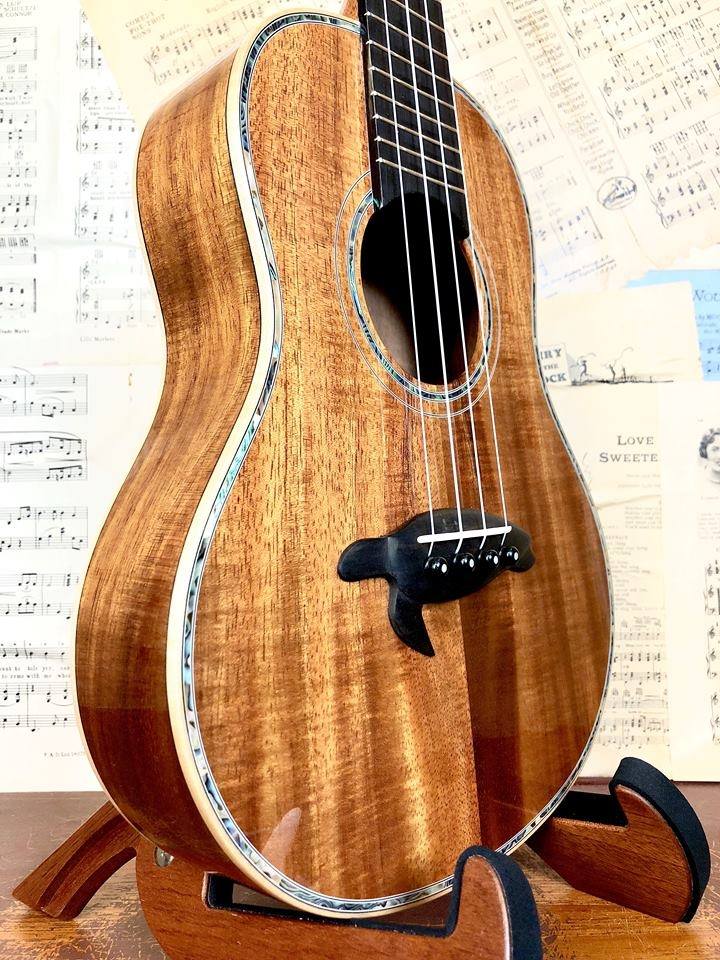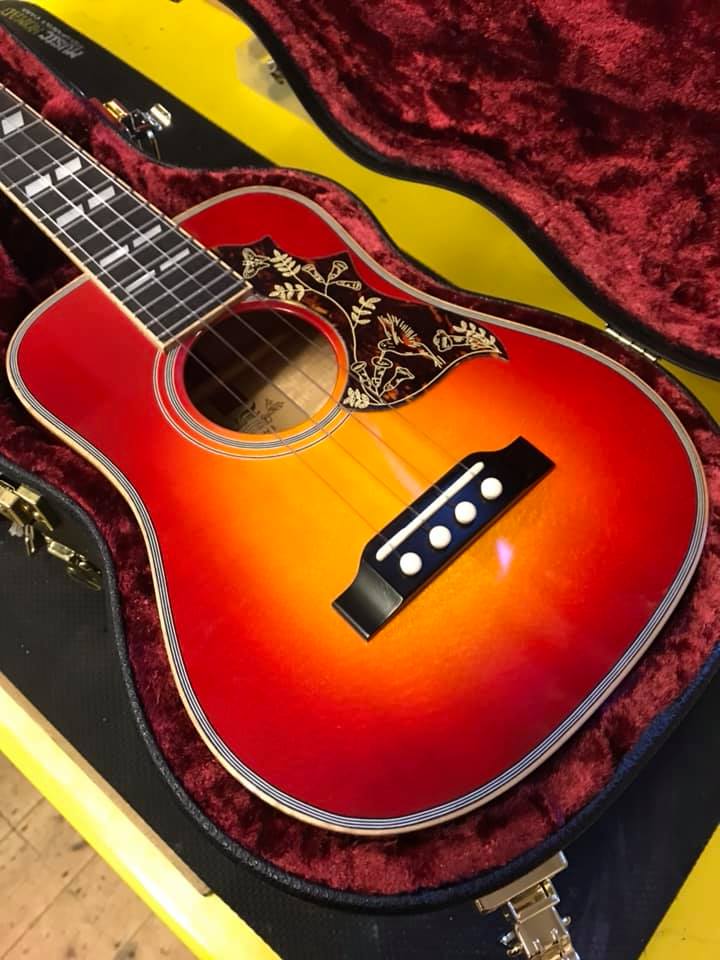 Member's Login
Member's Login
Selecting a Ukulele that Suits You
by Alex Bedrijczuk.
Wow, what an honour to be invited to write for the Ukulele Society - What a topic too! Before we begin, have a think about what you look for in a Ukulele? I have noticed in my ten years working with the instrument that people approach the Uke in different ways. Personally, my choice in Ukes has gone full circle; as a teenager I wanted slightly whacky shiny extrovert Ukes like Resonators or something that stood out. It didn't matter to me that a resonator made me louder than other people and that I couldn't play. I was happy as long as the instrument piqued my interest.
I then learnt about tradition and tonewoods and went through a decade-long phase of buying Mahogany or Koa Ukuleles before ultimately realising that if I didn't like how it looked - I wasn't getting the Ukulele out of its case enough. Regrettably, so many world-class instruments passed through my fingers in my twenties because they didn't inspire me in the way they might inspire somebody else.
The full circle bit is now - in a world with Instagram and my job taking me to places like the NAMM show (a large Music convention in California) I have recently rediscovered my love for the bigger, bolder and more ornate instruments I loved before I could play a note. I call it Ukulele art... If you want some examples check out Sumi, Kamaka, Kanile'a, Rebel or Kala Elite Ukes. Go on - google them now and I will wait...
Gorgeous I know but maybe that's not what you're after...
As manager of the Southern Ukulele Store - I meet all sorts of players every day and although what we are all looking for differs, there are some common themes.
Size - What size are you after?

If this is your first Ukulele then let’s look at your hands and height and go from there. Ten years ago everyone assumed that all beginners would start with a Soprano but if you've got the proverbial sausage fingers then wrapping those meaty spanners around a Soprano neck may do more to put you off than turn you on to the Ukulele. When preparing to write this article I took a sneaky look at our sales figures over a year and 6/10 first timers opt for a Concert size. Seeing that, it suddenly makes sense why many brands like Ortega and Snail don't even offer a lot of their models in a Soprano size due to lack of popularity.
You may also be surprised to learn we sell more Baritone Ukuleles than Sopranos to adult beginners so don't feel pressured into getting an instrument that is harder to play - learning an instrument is supposed to be fun.
But what if this isn't your first Uke? If you've subscribed to this magazine then you probably already know what size is your favourite so let’s discuss why you might choose one size over another when you make your next purchase.
Suitability - We've discussed body and scale size but what other things are a factor when making your decision?
Nut width is a popular question. The average nut width of a Soprano, Concert and Tenor is 35mm but many Tenor brands will have a nut width as wide as 38mm. Have a think about whether you are currently accidentally playing the wrong strings when you try to fret certain chords. A wider nut width usually goes hand in hand with a thicker neck profile and many players struggling to get used to barre chords, spreading their hands across the neck for a wider span or even just some players that get a sore thumb when they play will often find a slightly wider 36mm-38mm Nut width makes those problems go away once they are used to the newer size.
Brands with a selection of wider nut widths include KoAloha Opio's, Kanile'a and the Kanile'a Islanders. The wider nut width seems to be more common among Hawaiian-designed Ukuleles and not so much with Japanese or Chinese brands like Snail or Kiwaya.
I just mentioned neck profile which is another oft-asked question so let’s touch on it briefly. Most modern Ukulele manufacturers prefer a nice round neck that draws your hand inwards towards the fretboard. Kala, Ohana, Sigma and Snail all have very similar C shape necks. If you are trying a Ukulele in a shop and it's a bit uncomfortable and you can't figure out why - a different neck shape to what you are used to could be the reason you are/are not bonding with a Uke and you didn't even know it. An example of a Ukulele brand with a different neck style that is extremely popular is Kanile'a. They use a neck shape that feels more like a U than a C. The U shape has a very subtle flat point at the back of the neck which your thumb should naturally find when you are fretting chords - I can usually tell if someone will like a Kanile'a or not just by the way they rest their hand against the Ukulele.
Sound - You have to love how it sounds!

It's all well and good the instrument feeling nice and being easy to play but if you like a bright Uke with some volume and the one in your hand is warm and mellow then it might not be fit for purpose. So many times over the years I have encountered customers with Ukuleles that they loved the look and feel of but they assumed a change of strings would magically transform the sound and sadly that isn't always popular.
The best, short guide I can give you is the followings
Spruce/Cedar top Ukuleles will often have a bit of vibrancy to them. They will stand out in a crowd of other instruments and respond well to being strummed or picked harder.
A Mahogany top is warm and often has a slightly muddy sound that suits vocal accompaniment and has that 'vintage' sound.
Acacia has an Earthy quality to it. It is mellow and a little thinner and cleaner than Mahogany.
Koa is the traditional Hawaiian Ukulele sound. Mellow but clear and harp-like with lots of definition between notes. Similar to Acacia. Koa has a kind of bubbly innocent sound.
Set Up - Don't just ask for one with a low action.
The biggest tip I can give anyone reading this article is not to base their purchase on how high the strings sit from the fingerboard. If you buy your instrument from a reputable music shop, they should give the Ukulele a general set up before you take it home or they dispatch it to you. What we do at SUS with every Ukulele purchased is check the instrument for unreasonable cosmetic defects, check the intonation of the instrument and play notes on every fret across the fingerboard to make sure they produce a clean, clear note and make sure the strings are not buzzing. If a note sounds slightly stifled, we will often widen the nut slot... If the strings buzz when the note is played open it is not uncommon for us to replace or fill the nut back up and recut the slots. We are by no means perfect but a reputable music shop like us at SUS, World of Ukes, Eagle Music, Gear4music and others will do this before they let you even play the instrument. It pays to buy your musical instrument from a musical instrument shop and not a big box retailer that keeps their Ukuleles in a warehouse next to kids toys and the DVD's.
Style
The final thing to think about is the style of music you play. Of course, there is nothing to stop you playing George Formby on your double neck Ortega 8 string Uke but if you want that Formby sound you should definitely consider a Banjo Ukulele. Likewise, there is something so rewarding about playing blues Uke on a Resonator. Think how different Jake Shimabukuro's career may have been had somebody handed him a Risa LP on day one of Ukulele school... If you hear a particular sound and want to emulate it the best you can; do some research or ask somebody like us that might be able to steer you in the right direction. Otherwise, you might get all the other things on this list right but it still doesn't match the overall package you were looking for.
I've bored you enough. I hope some of this article has given you food for thought? If you have any questions drop me an email at alex@ukulele.co.uk or call one of the team on 01202 430820.
Until next time, thanks for reading
Alex
Visit the Southern Ukulele Store at https://www.southernukulelestore.co.uk/